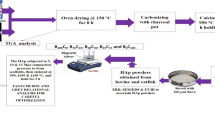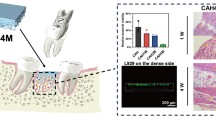Abstract
Crack propagation is one of the issues associating with dental composites which can significantly affect their performance. Current solutions for preventing and stopping the cracks include maximizing the filler to matrix ratio as well as fiber reinforcing of composites which are not always reliable. The precipitation of calcium carbonate (CaCO3) minerals by the generally recognized as safe (GRAS) bacteria can be seen as a novel approach to address this shortcoming. In the present study, the effect of microbially induced calcium carbonate precipitation (MICP) on filling dental composites’ cracks and cavities was studied. In this first step, the capability of different GRAS bacteria to induce CaCO3 precipitation was investigated. In the next step, the capability of potent bacteria to initiate MCIP in solid matrix was evaluated. For this purpose, the CaCO3-bacteria along with necessary nutrients were introduced into different dental composites in two ways, namely, powder and paste form. The light-cured composites were analyzed using optical microscopy, scanning electron microscopy (SEM), and energy-dispersive X-ray (EDS) to identify and characterize the precipitated CaCO3 crystals. It was shown that the incorporation of powder healing compound in two composites resulted in precipitation of CaCO3, while no crystals were formed when a paste form of healing compound was mixed with composites. The results evidently show that MICP can be a feasible alternative to current inefficient approaches to address microcracking issues in dental composites.





Similar content being viewed by others
References
Achal V, Mukherjee A, Basu PC, Reddy MS (2009) Strain improvement of Sporosarcina pasteurii for enhanced urease and calcite production. J Ind Microbiol Biotechnol 36(7):981–988. https://doi.org/10.1007/s10295-009-0578-z
Bernardo M, Luis H, Martin MD, Leroux BG, Rue T, Leitão J, DeRouen TA (2007) Survival and reasons for failure of amalgam versus composite posterior restorations placed in a randomized clinical trial. J Am Dent Assoc 138(6):775–783
Burbank MB, Weaver TJ, Williams BC, Crawford, RLJGJ (2012) Urease activity of ureolytic bacteria isolated from six soils in which calcite was precipitated by indigenous bacteria. 29(4):389–395
Cheng L, Cord-Ruwisch R (2012) In situ soil cementation with ureolytic bacteria by surface percolation. Ecol Eng 42:64–72. https://doi.org/10.1016/j.ecoleng.2012.01.013
Cramer N, Stansbury J, Bowman C (2011) Recent advances and developments in composite dental restorative materials. J Dent Res 90(4):402–416
De Muynck W, Debrouwer D, De Belie N, Verstraete W (2008) Bacterial carbonate precipitation improves the durability of cementitious materials. Cem Concr Res 38(7):1005–1014. https://doi.org/10.1016/j.cemconres.2008.03.005
Deo PN, Deshmukh R (2019) Oral microbiome: unveiling the fundamentals. J Oral Maxillofac Pathol 23(1):122–128
Dewhirst FE, Chen T, Izard J, Paster BJ, Tanner ACR, Yu W-H, Lakshmanan A, Wade WG (2010) The human Oral microbiome. J Bacteriol 192(19):5002–5017. https://doi.org/10.1128/jb.00542-10
Dhami NK, Reddy MS, Mukherjee A (2012) Improvement in strength properties of ash bricks by bacterial calcite. Ecol Eng 39:31–35. https://doi.org/10.1016/j.ecoleng.2011.11.011
Ferracane J (2008) Placing dental composites—a stressful experience. Oper Dent 33(3):247–257
Hammes F, Verstraete W (2002) Key roles of pH and calcium metabolism in microbial carbonate precipitation. Rev Environ Sci Biotechnol 1(1):3–7
Huyang G, Debertin AE, Sun J (2016) Design and development of self-healing dental composites. Mater Des 94:295–302
Kim HK, Park SJ, Han JI, Lee HK (2013) Microbially mediated calcium carbonate precipitation on normal and lightweight concrete. Constr Build Mater 38:1073–1082. https://doi.org/10.1016/j.conbuildmat.2012.07.040
Lai G-Y, Zhu L-K, Li M-Y, Wang J (2013) An in vitro study on the secondary caries-prevention properties of three restorative materials. J Prosthet Dent 110(5):363–368. https://doi.org/10.1016/j.prosdent.2013.06.011
LoCascio RG, Desai P, Sela DA, Weimer B, Mills, DAJAEM (2010) Broad conservation of milk utilization genes in Bifidobacterium longum subsp. infantis as revealed by comparative genomic hybridization. 76(22):7373–7381
Nedeljkovic I, Teughels W, De Munck J, Van Meerbeek B, Van Landuyt KL (2015) Is secondary caries with composites a material-based problem? Dent Mater 31(11):e247–e277
Okwadha GDO, Li J (2010) Optimum conditions for microbial carbonate precipitation. Chemosphere 81(9):1143–1148. https://doi.org/10.1016/j.chemosphere.2010.09.066
Ramachandran SK, Ramakrishnan V, Bang SS (2001) Remediation of concrete using micro-organisms. ACI Materials Journal-American Concrete Institute 98(1):3–9
Sadowsky SJ (2006) An overview of treatment considerations for esthetic restorations: a review of the literature. J Prosthet Dent 96(6):433–442. https://doi.org/10.1016/j.prosdent.2006.09.018
Sarda D, Choonia HS, Sarode DD, Lele SS (2009) Biocalcification by Bacillus pasteurii urease: a novel application. J Ind Microbiol Biotechnol 36(8):1111–1115. https://doi.org/10.1007/s10295-009-0581-4
Seifan M, Berenjian A (2019) Microbially induced calcium carbonate precipitation: a widespread phenomenon in the biological world. Appl Microbiol Biotechnol 103(12):4693–4708
Seifan M, Samani AK, Berenjian A (2016a) Bioconcrete: next generation of self-healing concrete. Appl Microbiol Biotechnol 100(6):2591–2602. https://doi.org/10.1007/s00253-016-7316-z
Seifan M, Samani AK, Berenjian A (2016b) Induced calcium carbonate precipitation using Bacillus species. Appl Microbiol Biotechnol 100(23):9895–9906. https://doi.org/10.1007/s00253-016-7701-7
Seifan M, Samani AK, Berenjian A (2017a) New insights into the role of pH and aeration in the bacterial production of calcium carbonate (CaCO3). Appl Microbiol Biotechnol 101:3131–3142. https://doi.org/10.1007/s00253-017-8109-8
Seifan M, Samani AK, Berenjian A (2017b) A novel approach to accelerate bacterially induced calcium carbonate precipitation using oxygen releasing compounds (ORCs). Biocatalysis and Agricultural Biotechnology 12:299–307. https://doi.org/10.1016/j.bcab.2017.10.021
Seifan M, Ebrahiminezhad A, Ghasemi Y, Samani AK, Berenjian A (2018a) Amine-modified magnetic iron oxide nanoparticle as a promising carrier for application in bio self-healing concrete. Appl Microbiol Biotechnol 102(1):175–184. https://doi.org/10.1007/s00253-017-8611-z
Seifan M, Ebrahiminezhad A, Ghasemi Y, Samani AK, Berenjian A (2018b) The role of magnetic iron oxide nanoparticles in the bacterially induced calcium carbonate precipitation. Appl Microbiol Biotechnol 102(8):3595–3606. https://doi.org/10.1007/s00253-018-8860-5
Seifan MK, Sarmah A, Ebrahiminezhad A, Ghasemi Y, Samani AK, Berenjian A (2018c) Bio-reinforced self-healing concrete using magnetic iron oxide nanoparticles. Appl Microbiol Biotechnol 102:2167–2178. https://doi.org/10.1007/s00253-018-8782-2
Seifan MK, Sarmah A, Samani AK, Ebrahiminezhad A, Ghasemi Y, Berenjian A (2018d) Mechanical properties of bio self-healing concrete containing immobilized bacteria with iron oxide nanoparticles. Appl Microbiol Biotechnol 102(10):4489–4498. https://doi.org/10.1007/s00253-018-8913-9
van Paassen LA, Ghose R, van der Linden TJ, van der Star WR, van Loosdrecht MC (2010) Quantifying biomediated ground improvement by ureolysis: large-scale biogrout experiment. J Geotech Geoenviron Eng 136(12):1721–1728
Van Tittelboom K, De Belie N, De Muynck W, Verstraete W (2010) Use of bacteria to repair cracks in concrete. Cem Concr Res 40(1):157–166. https://doi.org/10.1016/j.cemconres.2009.08.025
Van Tittelboom K, De Belie N, Van Loo D, Jacobs P (2011) Self-healing efficiency of cementitious materials containing tubular capsules filled with healing agent. Cem Concr Compos 33(4):497–505. https://doi.org/10.1016/j.cemconcomp.2011.01.004
Wang J, Van Tittelboom K, De Belie N, Verstraete W (2012) Use of silica gel or polyurethane immobilized bacteria for self-healing concrete. Constr Build Mater 26(1):532–540. https://doi.org/10.1016/j.conbuildmat.2011.06.054
Whiffin VS, van Paassen LA, Harkes MP (2007) Microbial carbonate precipitation as a soil improvement technique. Geomicrobiol J 24(5):417–423. https://doi.org/10.1080/01490450701436505
Wiktor V, Jonkers HM (2011) Quantification of crack-healing in novel bacteria-based self-healing concrete. Cem Concr Compos 33(7):763–770. https://doi.org/10.1016/j.cemconcomp.2011.03.012
Wilson CM, Loach D, Lawley B, Bell T, Sims IM, O'Toole PW, Zomer A, Tannock, GWJAEM (2014) Lactobacillus reuteri 100–23 modulates urea hydrolysis in the murine stomach. 80(19):6104–6113
Funding
The authors received financial supports from Kiwi Innovation Network Ltd. and the Emerging Innovator Programme funders: Norman Barry Foundation, K1 W1 and MBIE.
Author information
Authors and Affiliations
Corresponding author
Ethics declarations
Conflict of interest
The authors declare that they have no conflicts of interest.
Ethical approval
This article does not contain any studies with human participants or animals performed by any of the authors.
Additional information
Publisher’s note
Springer Nature remains neutral with regard to jurisdictional claims in published maps and institutional affiliations.
Rights and permissions
About this article
Cite this article
Seifan, M., Sarabadani, Z. & Berenjian, A. Microbially induced calcium carbonate precipitation to design a new type of bio self-healing dental composite. Appl Microbiol Biotechnol 104, 2029–2037 (2020). https://doi.org/10.1007/s00253-019-10345-9
Received:
Revised:
Accepted:
Published:
Issue Date:
DOI: https://doi.org/10.1007/s00253-019-10345-9




